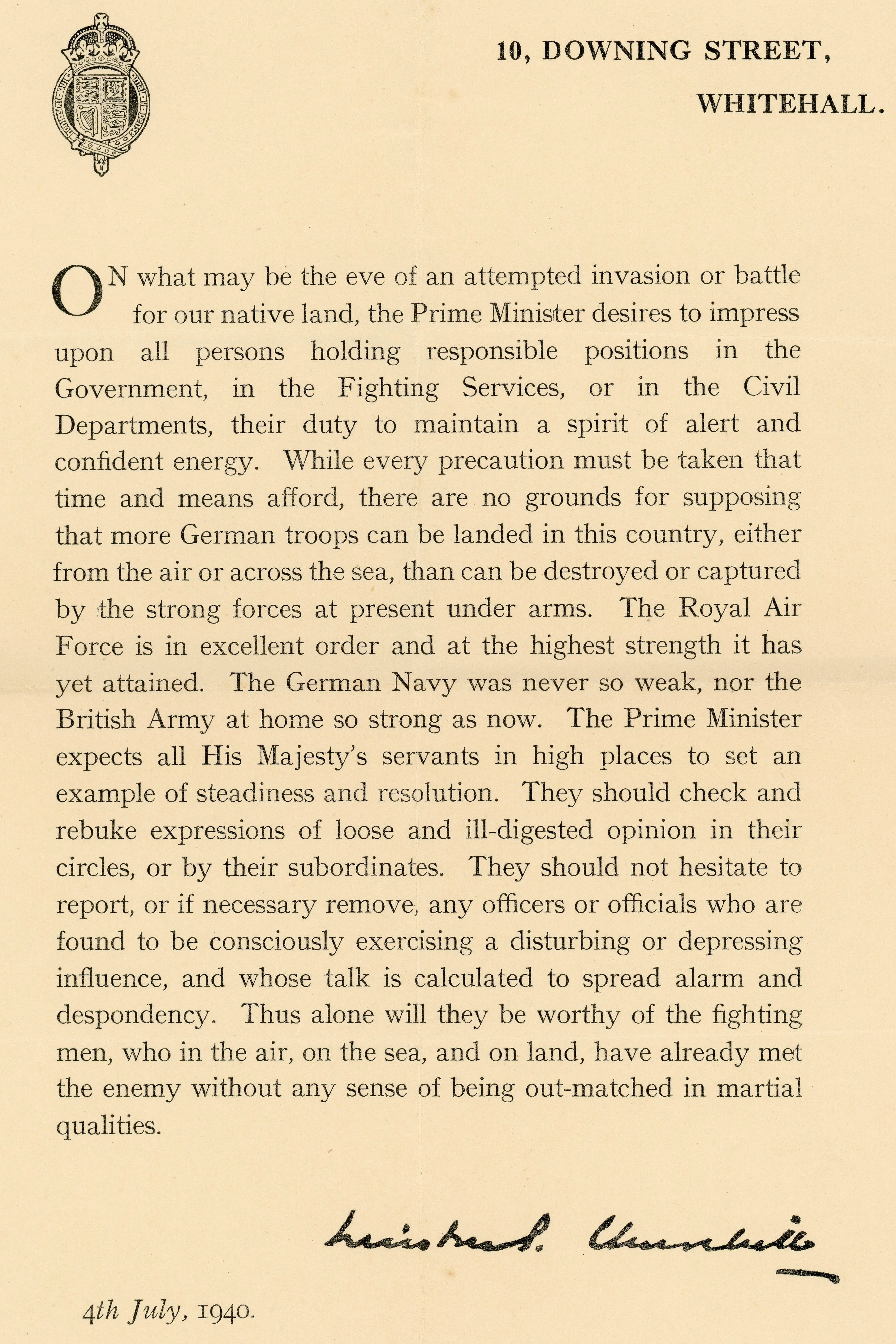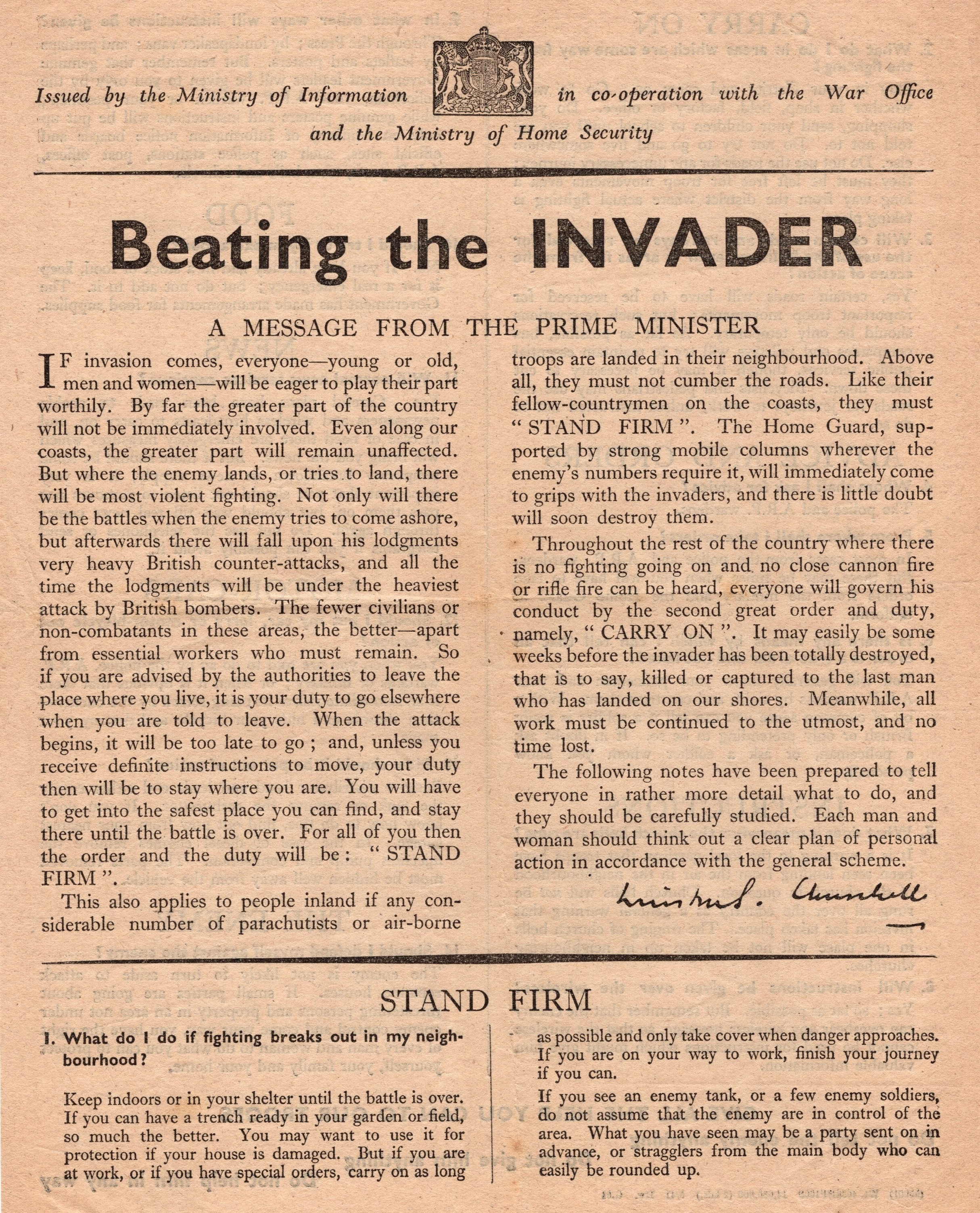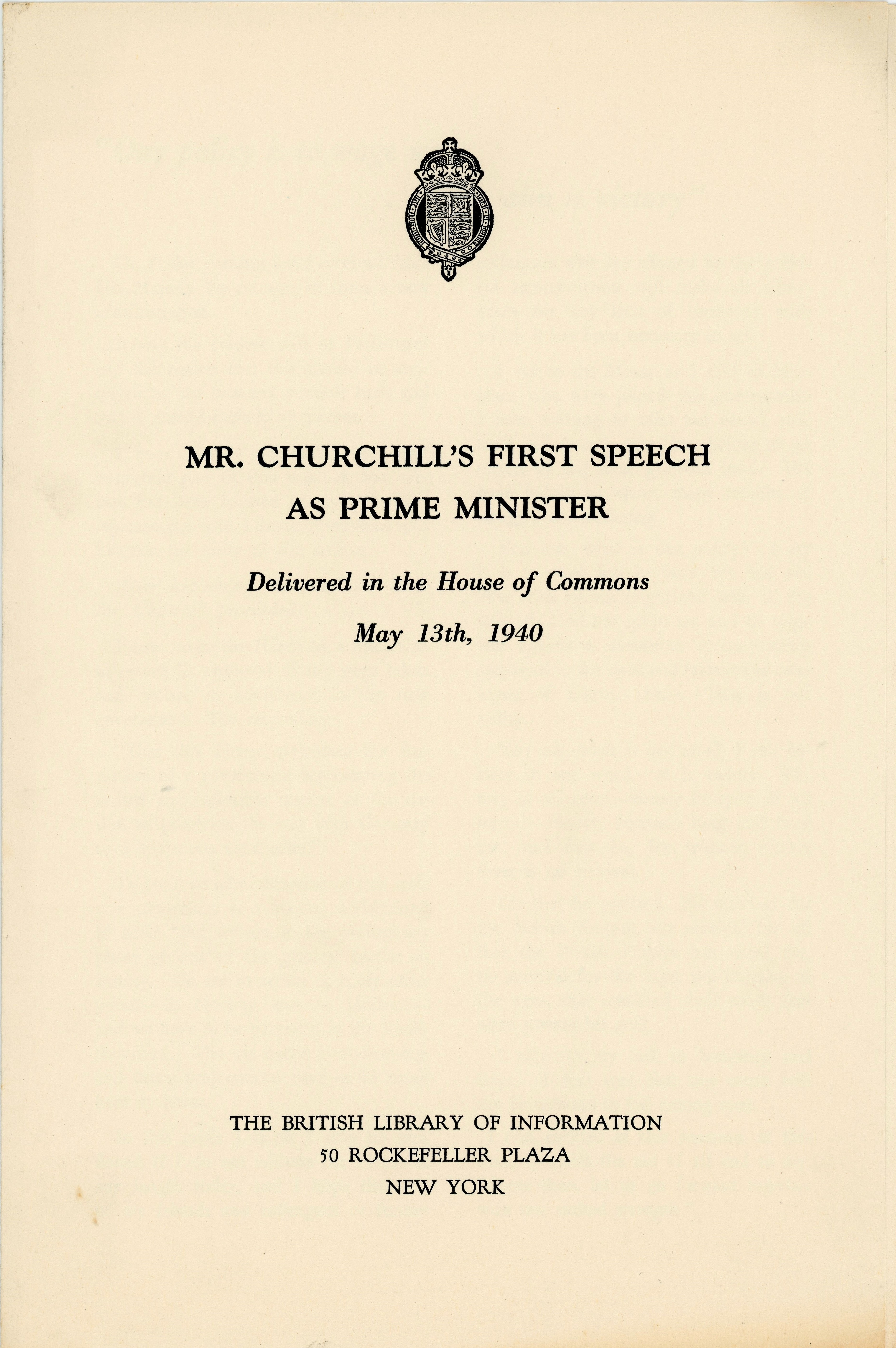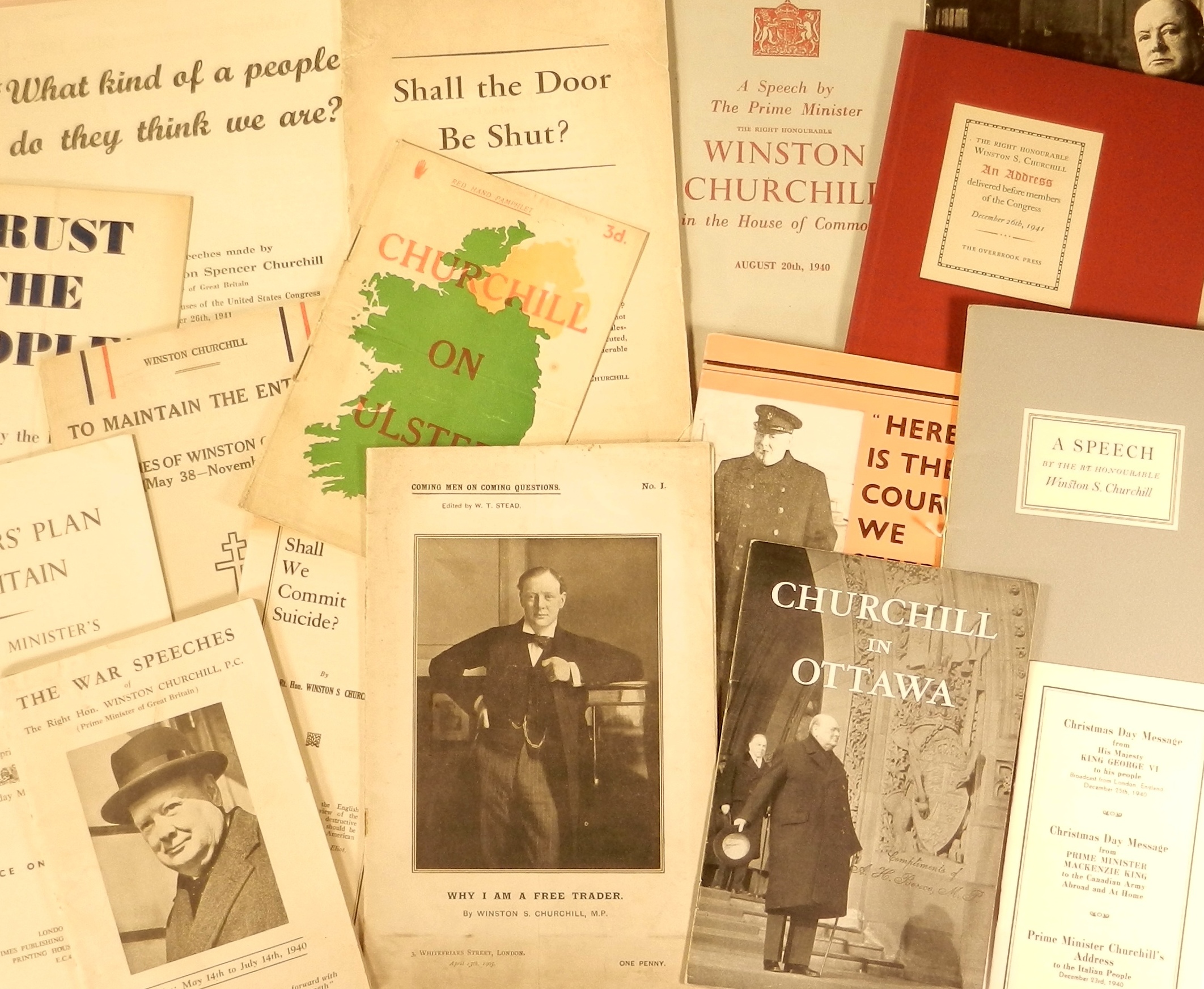“On the eve of an attempted invasion or battle for our native land… The Prime Minister expects all His Majesty’s servants in high places to set an example of steadfastness and resolution…”
These are the words of Prime Minister Winston Churchill on a leaflet dated 4 July 1940. This extraordinary – and extraordinarily scarce – wartime message is a tangible reminder that, less than two months into Churchill’s wartime premiership Britain’s peril was dire and her resolve needed stern bracing, even at the highest levels. This leaflet conveys a visceral sense of the urgency of the moment that is harder to absorb from any of Churchill’s book-length works. Even his war speeches volumes.
Recently, we added a small hoard of 55 Churchill pamphlet and leaflet publications – including this one – to our listed inventory. Collecting Churchill’s words is often approached via books. After all, he wrote a lot of them. But it turns out that far more pamphlets and leaflets featuring Churchill’s words were published than books. Often they are printed on cheap paper and bound with little more than staples or string – if they are lengthy enough to be bound at all. Moreover, many of these ephemeral items are quite considerably scarcer than their bookish counterparts. Some are the first published appearance of the words they carry. More than a few are so rare as to be more elusive than all but the two rarest of Churchill’s book-length works.
But pamphlets and leaflets are compelling for reasons beyond mere scarcity. Churchill’s myriad pamphlet and leaflet publications span nearly the entirety of his public life. (The earliest of which we are aware dates from 1 June 1899.) More often than not they publish either his speeches (what the Nobel Prize folks called his “…brilliant oratory in defending exalted human values”) or other exigent communication ill-suited to either the bulk or slow publishing process that appends to books. This exigence often results in a publication that feels more tethered to the immediacy of the moment that produced it. The leaflet discussed above is an excellent example.
The historical narrative of Churchill’s Second World War Britain is tinted with a deeply-rooted sacrificial resolve that saw Britain persevere – and persevere with the inspiring, confident Churchillian persona that girded British resolve. Yet this unsettled message to Britain’s institutional leadership – and the notional necessity that provoked it – muddles a conventional narrative.
The message is only 241 words printed on one side of a leaflet, but those words are quite striking. Perhaps not surprising is the exhortation to “maintain a spirit of alert and confident energy”. But it is telling that senior government officials needed to be explicitly told that “there are no grounds for supposing that more German troops can be landed in this country… than can be destroyed or captured…” Likewise, some of the phraseology of this message in Churchill’s name seems less than sure-footed. The phrase “The Prime Minister expects…” cannot help but feel like a rhetorical knockoff of Nelson’s famous Trafalgar message “England expects that every man will do his duty.” The more negative exhortations are understandable in the context of the time, but are nonetheless unsettling, bordering on Orwellian. Officials are directed to “check and rebuke expressions of loose and ill-digested opinion” and “report, or if necessary remove, any officers or officials…consciously exercising a disturbing or depressing influence, and whose talk is calculated to spread alarm and despondency.”
This rare early wartime intra-governmental communication is a blunt reminder that when Churchill became Prime Minister on 10 May 1940, Britain’s war was not so much a struggle for victory as a struggle to survive. Churchill’s first months in office saw, among other near-calamities, the Battle of the Atlantic, the fall of France, evacuation at Dunkirk, and the Battle of Britain – which was less than a week from commencing when this communication was distributed. Hitler’s massive, sustained aerial assault that began on 10 July 1940 was the preparatory effort to gain air superiority for a planned invasion of England, “Operation Sea Lion”. By most accounts, that outcome was only narrowly avoided. British resolve eventually became axiomatic, but as late as April 1941, the Ministry of Information and the Prime Minister were still issuing printed instructions to all British households regarding what to do in the case of invasion.
Of course, know all this from the volumes that have been written about the Second World War – both by Churchill and others. But we feel it when we read this leaflet. The moment actually seems to echo in this mere scrap of paper, which has improbably survived its original purpose and seems to convey far more than the few words printed on it.
Even less obscure wartime pamphlets and leaflets can convey the sense of the moment in which they are rooted. A compelling case in point is the series of Churchill’s speeches printed by the British Library of Information (BLOI) in New York, a branch of the British Foreign Office.
The British Library of Information published thirty-two statements, speeches, or broadcast addresses by Prime Minister Winston Churchill beginning with his first speech as Prime Minister of 13 May 1940 and ending with the broadcast address of 29 November 1942. These editions were often issued within two or three days of delivery and “reveal the political determination of the British government to bring the inspiration and steadfastness of the Prime Minister and the British nation to an American nation not yet engaged in the war. Indeed, twenty-two of the BLOI speech pamphlets were published before Pearl Harbor.”
In many cases, these BLOI publications of Churchill’s speeches in America were the first time these speeches were available in print to the public. Speed was deemed essential and “it was not always possible to check with the authoritative text.” Comparison of these BLOI texts with later definitive editions often reveals discrepancies. (Cohen, Vol. I, A120, p.513) These discrepancies are telling; given Churchill’s legendary attention to the specificity of his words – particularly those he committed to print – one can hardly imagine a more significant indication of the sense of urgency manifest in these publications.
Of course, Churchill’s pamphlet and leaflet publications are not all speeches and wartime. In those listed on our website you will find correspondence with world leaders, wonkish public policy prescriptions and presentations, prescient speculation and plans for the future, ruminations on the past, reflective essays, political exhortations, and poetic quotations.
The myriad campaigns and conflicts in which Churchill engaged over roughly two-thirds of a century in public life are now long-settled history. Churchill’s many published books testify to this history. Carefully crafted, soberly considered, diligently edited, and duly bound, they are a fixed and dignified presence, a still, sober weight on our shelves. But save some space between them. Certainly, Churchill’s myriad published pamphlets and leaflets are more humbly bound, often hastily conceived, slight in stature, and ephemeral in both material and purpose. But they are often very much of the time and place they were meant to influence. Many convey a sense that they still actively witness the history they – and their author – helped to make.
Cheers!





